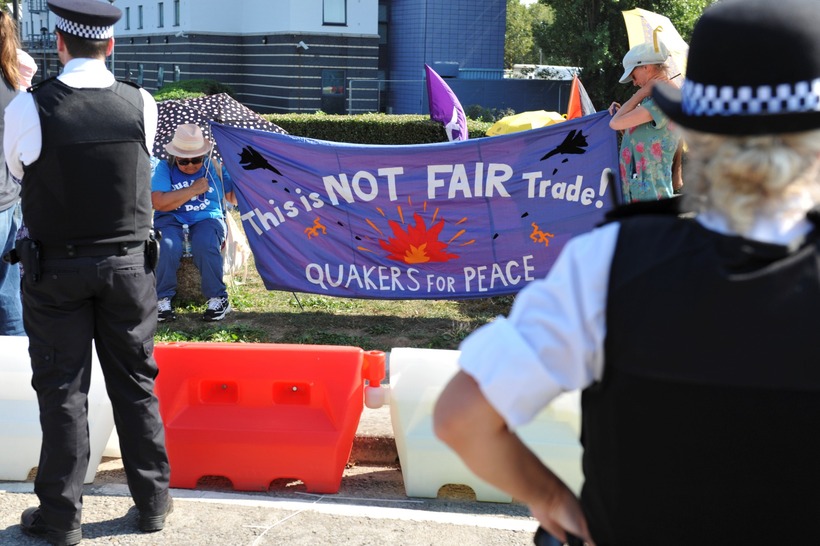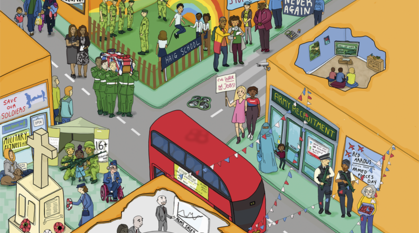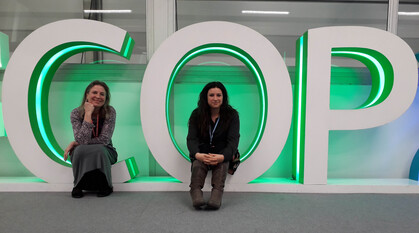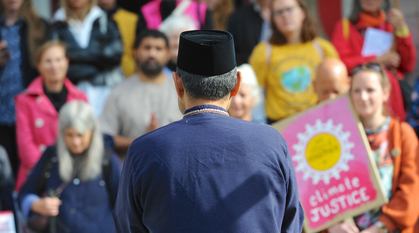Why are Quakers always at protests?
From campaigns for climate justice to protests against war, Rhiannon Grant takes a look at why it's quite common to see Quakers marching with a banner.

Student Christian Movement (SCM) staff member Phoebe says "if she ever needs anything/feels worried at a protest, she always looks for a lesbian or a Quaker to help her out" (according to their Facebook post).
I can see how this could often work. SCM's suggested ways of identifying Quakers, which include "enjoys being silent" and "beautiful handmade banners", are also generally sound. But why are you likely to find a Quaker at a protest? What is it about Quakers which gets them out onto the streets for the kind of organised marches and demonstrations which call for those beautiful banners? And are you likely to find the crossover, a Quaker lesbian?
Here are three things about Quakers which can help answer those questions.
1. Quaker faith encourages being politically active
People often think of religious beliefs as personal and private, and politics as to do with the public sphere, so religion and politics can seem opposed. But Quakers don't see it that way.
Being politically active doesn't just mean party politics, although individual Quakers are actively involved in several different political parties at local and national levels. Politics is about people, and because Quakers value each person equally as children of God we are also invested in the things which help everyone to live well and be involved in society.
This means that some political campaigns in the broader sense – against war, for greater economic and climate justice, and to create a more equitable society – attract lots of Quaker support.
Individual Quakers and each of our many Quaker communities discern for themselves how to be involved and which issues to work on. There's a good deal of variety, but some concerns come up from the grassroots to become positions adopted by British Quakers as a whole. In recent years, issues on which Quakers in Britain have agreed – and about which lots of Quakers have joined demonstrations – include
action on the climate crisis and ending the genocide in Gaza.
2. Quaker faith supports speaking out peacefully
Quakers use silence in our worship but aren't quiet the rest of the time. The Quaker commitment to telling the truth and treating everyone equally means we are happy to speak up to people in positions of power.
We respect people in power as people, even when there's a disagreement, and oppose all forms of violence, but also see it as a religious duty to draw attention to truths and perspectives politicians might be missing. That includes the voices of people harmed by geopolitical situations, such as the victims of war, people suffering the effects of climate change, and refugees and asylum seekers.
Speaking out peacefully takes many forms. Protests, marches, and demonstrations are important ways of raising awareness. Quaker groups are often involved when the cause lines up with Quaker values – and they'll bring a banner if they have one.
A particular Quaker form of protest is to hold a meeting for worship somewhere significant, such as outside the nuclear base at Faslane.
[QUOTE-START]
Respect the laws of the state but let your first loyalty be to God's purposes. If you feel impelled by strong conviction to break the law, search your conscience deeply. Ask your meeting for the prayerful support which will give you strength as a right way becomes clear.
- Advices & queries 35
[QUOTE-END]
Sometimes individual Quakers feel that it's right to take direct action against objects which are used to cause harm, or to disrupt organisations which are causing harm. Lots of Quakers also sign petitions, write letters, participate in learning and conversations, raise money, and support campaigns in many other less visible ways. Quakers also specifically support the right to speak out and actively challenge laws which restrict our right to protest.
3. Quaker communities welcome LGBTQIA+ people
So you're likely to meet a Quaker at a protest – not every Quaker and not every protest, but it's a fair generalisation. What about Quaker lesbians? Also likely!
British Quakers welcome members of the LGBTQIA+ community and have a track record of explicit support. Highlights include the 2009 decision to make the same marriage arrangements for same-sex couples as opposite-sex couples in Quaker meetings, and a statement affirming and welcoming trans, non-binary and gender diverse people in 2021.
Lesbian, gay, bisexual, trans, and nonbinary people are active across the Quaker community and involved in all parts of our work. There are also dedicated groups like Quaker Rainbow, who do things like joining the London Trans Pride march.
I can also speak to this personally. I'm a queer cis Quaker woman, who married my wife in a Quaker wedding. My protests tend towards letter writing but sometimes you'll find me at a march or a demonstration. And if you do, I'm probably carrying a water bottle, a safety pin, and a plaster, and will be happy to help if I can.


